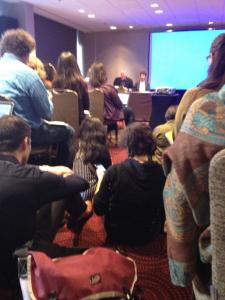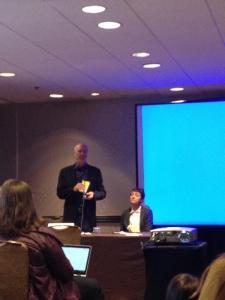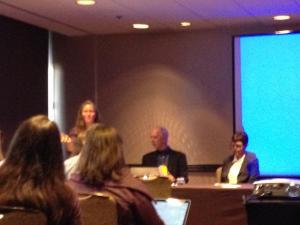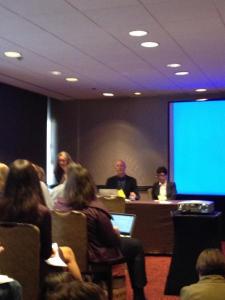By Molly Berg
What makes a good editor and how do you become one? In a packed room at the annual NASW conference, four science editors discussed that question, as well as an editor’s duties, the relationship between editors and writers, and the ethical challenges editors regularly face.Moderated by Siri Carpenter, co-founder and editor-in-chief of the science writing blog The Open Notebook, the panel included a series of questions posed to each of the four editors, then opened up for a Q&A session at the end.
Participating panelists included Laura Helmuth of Slate, April Reese of Discover, Jamie Shreeve of National Geographic and Robin Lloyd of Scientific American.
To begin the panel, the four discussed what editors really do and what marks the difference between editors and writers.
“The job of an editor is misunderstood,” said Reese. “We do a heck of a lot more than edit.”
The editors explained that while they do edit, that only takes up a small portion of their day. Their other duties include attending meetings, doing administrative work, vetting pitches, dealing with legal issues and making sure writers get paid, among other tasks.
The panelists also discussed common mistakes made by editors. One of them was taking a writer’s story and transforming it into a piece the editor would have personally written.“Be open to the fact that someone has a different voice,” said Shreeve. “You have to know when to impose your vision on the story and when to back off.”
He explained that part of editing is finding the balance between guiding writers towards better stories, while still allowing them to maintain their written voice.
“To avoid imposing the story, I leave it up to the writer to make the suggested changes,” added Reese.In terms of communicating with the writers about edits, the panelists also shared their unique insights.
“My role is to be helpful to them,” said Lloyd. “If a story’s worth rescuing, I’m going to go in there and rescue it.”
Reese also explained that she leads her editing feedback with encouragement. She said that editors need to remember that writing is hard work and that they can help writers fill in holes after praising what was done well in the story.
The editors also discussed the ethics involved in their profession. One of the big issues had to do with confidentiality.
“Writers can complain about editors by name,” Helmuth said. “Editors can’t do that about writers. People should only read what gets published.”
In terms of ethics, the editors discussed whether or not writers should attempt personal takedowns.Helmuth said the writer should only do takedowns of people more powerful, not less, than the writer. She suggested that they can be done later in a writer’s career, especially since they could have a big impact.
Helmuth also stressed that editors should be aware of who’s getting bylines in their publication and how it reflects diversity (or the lack of) at the organization. Having diverse bylines is a service to both the publication and its readers, she said.
The session ended with scenarios specific to the editors, as well as questions from the audience.
Lloyd wisely summed up the role of editor during the scenarios portion of the panel.
“A lot of news editing is keeping your cool and being a leader,” said Lloyd. “You want to get it first, but you also want to get it right first.”
“




